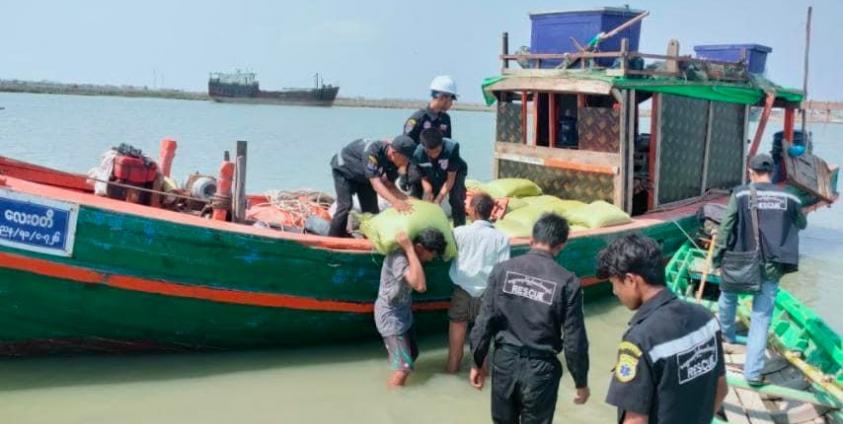After the Military Council detained and interrogated well-known author Wai Hin Aung, who had been actively involved in Cyclone aid operations in Rakhine other philanthropists have adopted a more cautious approach to their relief efforts.
Despite the prevailing atmosphere of anxiety, aid workers in Rakhine State remain resilient and committed to their ongoing humanitarian efforts, according to a leader of the Mrauk-U-based social aid organization.
This civil society leader of a local aid organization said "We all have concerns, not only our group, but all social aid organizations in Rakhine State, have concerns. While we persist in our work, the constant fear of being interrogated or arrested by the Military Council looms over us. Consequently, we are collectively and anxiously press ahead with our rescue operations.”
On May 23rd, the Military Council apprehended a total of 5 members from the Bo Sein Social Relief Organization, including Wai Hin Aung, who had traveled to Ponnagyun Township to provide relief aid to those affected by the cyclone. Fortunately, they were released the following day.
These arrests had sent a strong signal to all social relief organizations operating in Rakhine State, raising their level of vigilance and concern.
"In this situation, we are all deeply concerned. The arrest of Sayar Wai Hin Aung serves as an indirect threat to every social relief worker dedicated to their work in Rakhine State. These arrests are clearly orchestrated to intentionally impede the progress of humanitarian aid workers striving to alleviate the suffering of those in dire need”, a leader of the Arakan Students Union told Narinjara.
Since the apprehension of Wai Hin Aung and his colleagues, there haven't been any further instances of social relief workers being arrested in Rakhine State. However, the lingering apprehension regarding the potential for the Military Council to conduct more arrests at any given moment, remains prevalent among the local aid workers, he added.
"Harassing philanthropists like Sayar Wai Hin Aung and members of our Student Union during this critical period is akin to exacerbating the suffering of those affected by the storm. Hence, even if the Military Council does not actively endorse and assist those engaged in social relief efforts with a genuine approach, we implore them not to disrupt their crucial work”, the Student Union leader said.
"Although Sayar Wai Hin Aung was promptly released following his arrest, the incident did have a discernible impact on charitable organizations to some extent. Nonetheless, given the profound distress experienced by the public, it is our ardent hope that the pace of voluntary relief efforts remains undeterred. But we already anticipate inevitable challenges, such as time delays resulting from the necessity to bypass closely monitored routes”, another relief worker told Narinjara.
Cyclone Mocha wreaked havoc in the townships of northern Rakhine State, causing significant devastation. Approximately 90 to 95 percent of houses, infrastructures, and religious buildings were adversely affected and damaged, tragically resulting in the loss of nearly 150 lives. (a very conservative estimate.)
Nearly two weeks have elapsed since the cyclone's onslaught, yet most of the people impacted by the storm are still awaiting substantial aid from both the Military Council and the international community. Locals said that numerous villages in the affected region are already grappling with acute scarcities of food and clean water.
A storm-affected resident of Kyauktaw Township denounced the Military Council's arrest and interrogation of social relief workers assisting storm-affected individuals, asserting that, such actions effectively drive the already-struggling populace towards the precipice of starvation.
"Even if they are unable to aid the dedicated philanthropists doing their utmost to help, the Military Council ought not to disrupt them, especially considering that they themselves have failed to provide any assistance to the desperate public”, he said.
With the rains in Rakhine State increasing and the onset of the rainy season becoming apparent, there is an immediate and pressing necessity to promptly address the reconstruction of collapsed houses. Additionally, social relief workers have emphasized the crucial role of the Military Council in addressing the challenges faced by the people in terms of their livelihoods and healthcare needs.







